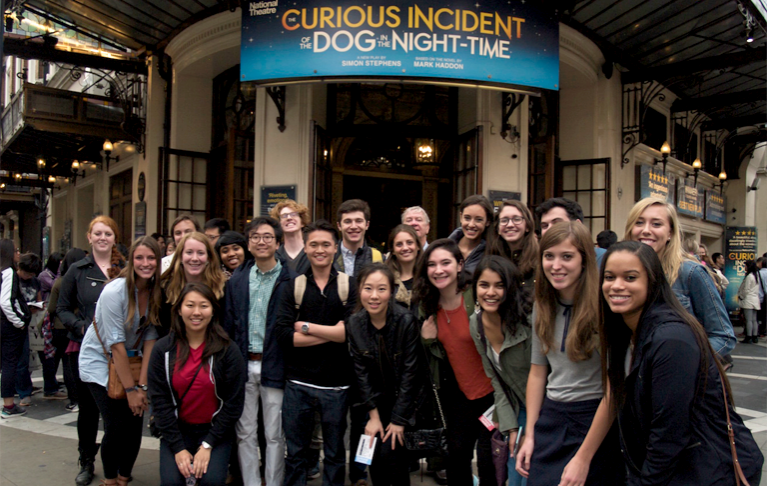
Students saw 15 plays throughout the program, starting with the Tony Award-winning play The Curious Incident of the Dog in the Night Time.
Tuesday, December 6, 2016
By Blake Cole
Immersing yourself in a good book or becoming absorbed in a play at the theater is one thing, but what if you could walk around Bloomsbury, London while studying Virginia Woolf, travel to the city’s Globe Theatre to get a sense of the original conditions in which Shakespeare’s plays were performed, or explore the East End to understand the changing demographics of migration into London from the Victorian age through today?
These are the once-in-a-lifetime study experiences of students in the Penn English Program in London (PEPL), says Zachary Lesser, professor and undergraduate chair in the Department of English. Each fall around 15 students travel to England to study for credit at the storied King’s College of the University of London, which represents about 15 percent of all the English majors for the year. “Living and studying with British students provides a new perspective, and not only on British literature” says Lesser, a past director of the program. “Our students who take a class in American literature there often say it was the most interesting class they had.”
A perpetual favorite of students in the program is the theater course led by renowned theater critic Michael Billington. Under Billington, students learn a new form of professional writing: the theater review. Provided with a broad range of viewing options, students attend at least one performance per week, visiting famed venues like the National Theatre and Shakespeare's Globe, but also smaller Off-West End and Fringe Theatres like the Young Vic, the Almeida, and the Finborough in Earl's Court. Students discuss their experience in seminar fashion the next day then write a review of the play.
“For me, the main aim is to give the students a broad experience of theatre and to get them to apply their gift for analysis—often honed through their prior studying of literature—to drama,” says Billington. “I try to make class discussions as democratic as possible and give everyone in the room a chance to air their views. But I am also keen to get the students to write with maximum clarity, elegance, and wit—to show them that criticism can be an art. In the age of the blogosphere, when the ether is awash with people airing their point of view, I try to encourage the students to engage in detailed, rational analysis.”
Unique learning experiences abound outside of the theater. “Getting students to ‘walk a novel,’ or to be in a part of the city where a play takes place, or to get them to the top of St. Paul’s to survey the city as a historical palimpsest—because you really can see it all from up there!—is key,” says Michael Gamer, associate professor of English and current director of PEPL.
Daniel Rich, C’17, a past participant, says one thing everyone from the program would agree on is that spending time in London makes you realize just how important theater is to the culture as a whole. “It is a source of national pride and something people from all of walks of life—from politicians and teachers, to travelers and students—can learn from and enjoy,” he says.
Penn’s College of Liberal and Professional Studies organizes a related Penn in London summer program, also focused on literature and the theater arts. It attracts students from diverse academic backgrounds, including non-traditional students. The program is taught by Penn faculty, as well as Michael Billington. Emily Steiner, a professor of English and the 2016 summer program director, says the most meaningful experiences often occur off the beaten path. “Michael Gamer arranged this fantastic walk from Anne Boleyn's castle, which is called Hever Castle, to Sir Phillip Sidney's castle, called Penshurst,” Steiner says. “And I've taken students on a tour of the treasures of the British Library. We see the original Beowulf manuscript, the Beatles original sheet music, and unbelievable, rare Hebrew manuscripts.” And, London, being the epitome of the international city, makes for a rich learning environment. “The Anglophone literary traditions we teach there are not just Shakespeare and Austen but also Zadie Smith,” Steiner continues. “The theatre experience, too, encompasses diverse theatrical cultures and hot political topics.”
Breanna Himschoot, C’18, says choosing to study abroad with the Penn-in-London program was one of the best decisions she has made since coming to Penn. “I gained invaluable relationships with the people that I lived and studied with and the theatre program allowed me to venture all over London, usually to parts that I wouldn't have explored on my own. The walks in the countryside gave a new perspective to a place I usually consider urban and stunning views that I'll never forget.”
Steiner says a potential goal for the future of the program is to involve more Penn alumni based in London. “One of the things I’d love to see happen is an event each summer and fall with the alumni on the ground,” she says. “Maybe they could all go to a play together and then have a conversation together, or maybe just go out for tea. Something where the students can connect with those alumni.”